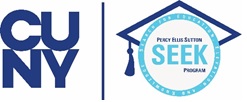Special Announcement for January 26: SEEK Virtual Room Open
The SEEK Office, located in Building 1A Room 113, is open Monday through Friday, from 9 am to 5 pm. You can visit the office, email us at SEEK@csi.cuny.edu or call 718.982.2410 to reach a staff member. Please be sure to include your name, phone number and 8 digit CUNYID in all correspondences, so that we can assist you as quickly as possible.
Important:
- Students - Check your CIX email regularly for important information from CSI and SEEK

Thinking about Applying to SEEK? The SEEK Program at the College of Staten Island, invites students, parents, and high school counselors to attend a SEEK Information Session to learn about the College of Staten Island, SEEK’s eligibility requirements, and how to secure a spot in the upcoming fall class.
Contact Information
Percy Ellis Sutton SEEK Program (SEEK)
How to Apply to SEEK
Email How to Apply to SEEKTutoring and Academic Support
Email Tutoring and Academic SupportOffice Hours
Monday - Friday
9AM - 5PM
SEEK Events
About SEEK
Established in 1965, The Percy Ellis Sutton Search for Education, Elevation and Knowledge Program (SEEK) is a higher education opportunity program offered in the senior colleges of the City University of New York (CUNY). Students are admitted into SEEK regardless of age, sex, sexual orientation, race, disability, or creed.
SEEK's primary mission is to assist in providing equality of higher education to students who otherwise would not have such access. SEEK provides comprehensive academic, financial, and social supports to assist capable students who otherwise might not be able to attend college due to their educational and financial circumstances. The effort is intended to increase the level of education, social capital, and workforce expertise within our community. The major objectives are as follows:
- To assist selected students with specifically defined educational and economic needs to achieve a high quality college education and expand their social and career capabilities.
- To provide a range of intensive support services including supplemental instruction, counseling, and enhanced financial aid to enable students to bridge the gap between remedial programs and the regular college curriculum.
- To develop, utilize, and demonstrate innovative educational techniques that will enable capable students to overcome the challenges of under-preparation and other relevant disadvantages with the goal of obtaining a college education.
To learn more about the SEEK and College Discovery Programs please: https://www.cuny.edu/academics/academic-programs/seek-college-discovery/

